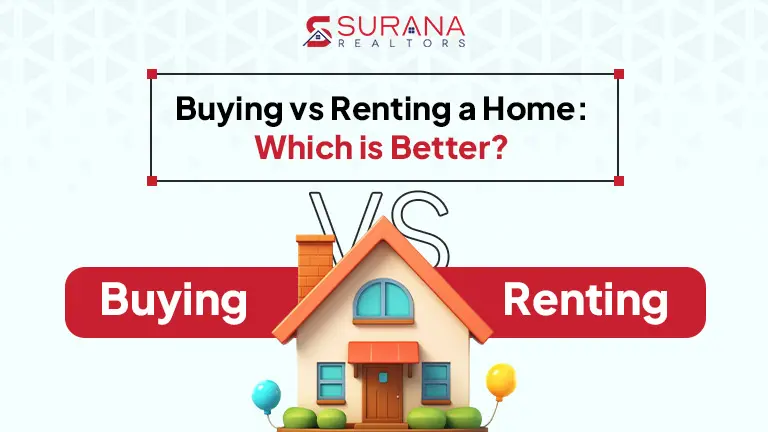One common concern that everyone faces while buying a house is buy vs rent a house. Considering the soaring property rates, people usually opt to rent, but buying a home is a life achievement that most people dream of.
Both options have their pros and cons. Buying a house is an accomplishment. You have your happy place to make memories with your family and loved ones. You enjoy a pride of ownership, and a lot of emotions are attached to this decision.
On the other hand, renting a house is an easier and more affordable option that requires less commitment while offering greater flexibility. However, you lack the security of a permanent home.
This dilemma is real and can sometimes be frustrating, especially when building your future.
Therefore, in this guide of buying vs renting house, we will consider emotional and financial factors of both choices and discuss pros and cons of buying and renting.
Buy vs Rent House- Financial Factors
The following are financial considerations for buying vs renting home:
1. Budgeting
When buying a house, you must consider down payment, brokerage, registration fees, and other associated expenses.
When renting, you need to incur costs related to security deposits, advance rent, and broker fees, along with the monthly rent as a recurrent cost.
2. Long-term Investment
Buying a home is a long-term commitment and investment. The value of your property will increase over time.
Renting has no investment, and there is no gain based on the property’s value.
3. Variable Costs
When you buy a house, you also have to take care of variable costs, such as property taxes, maintenance, and unexpected repairs.
Renting demands variable costs, like rising rents or utility charges, but there are no property taxes.
4. Ownership
The amount you pay to buy a house eventually contributes to you owning the property completely.
Renting a house means having a place to live but no long-term commitment, as you won’t own the property.
5. Budget Flexibility
Once you buy a house, it’s hard to change your decision or spending plan.
Renting allows you to shift to another affordable place.
6. Upfront Costs
Buying a house includes the following upfront costs:
- Registration fee
- Down payment
- Stamp duty
Renting a house includes the following upfront costs:
- Security Deposit
7. Ongoing Costs
Buying a house demands a few ongoing costs, such as:
- Maintenance
- EMIs
- Property Taxes
Renting a house has only monthly rent as an ongoing cost.
Buy vs Rent Home- Emotional Factors
The following are the key emotional factors to consider for buy vs rent a house:
1. Sense of Ownership and Stability
Buying a house is a milestone, providing you with a sense of stability and ownership. You find a place where you can live with your family. Also, you get financial stability as a house owner as you can rent or sell it according to your requirements.
You may not enjoy these benefits or a sense of ownership when you rent a house.
2. Security
When you buy a house, you are rest assured that the place belongs to you and there will be no eviction concerns.
However, renting ensures ease of mobility, but there is a constant feeling of temporary belonging.
3. Sense of Achievement
Owning a house is a significant accomplishment in anyone’s life that signifies personal success.
Renting gives you flexibility, and there’s no long-term commitment.
4. Lifestyle and Family
Once you repay the entire loan, you need to deal with maintenance and repair costs, which are lower than monthly rent. Hence, you can save money and invest it in other avenues. Also, your kids will inherit the house in the future, providing them with a secure place to live.
When you rent a house, you need to pay monthly rent, which can increase every year. This can be a financial burden in the long run. You don’t build an asset but create memories.
5. Flexibility and Freedom
Buying a house means you will be tied to a fixed place, and if you wish to settle down elsewhere, you must sell it.
Renting provides more flexibility and freedom to live anywhere. You can choose to live in any location you want and relocate without hassle.
Buy or Rent Home- Pros and Cons
Below, we have discussed the advantages and disadvantages of buying vs renting house:
1. Pros of Buying a House
- Fixed liability & fixed tenure
- Appreciating long-term value
- Building a long-term asset
- Sense of ownership
- Passive income through rent
- Can be used as collateral for secured loans
- Huge tax benefits
- Tangible asset
- Stability and security
- Your kids can be legal heirs of your property
2. Cons of Buying a House
- Liable for property tax
- High Upfront Costs
- Selling a house can be time-consuming and daunting
- Large initial cost
- Timely maintenance and renovation required
- Less flexibility when it comes to moving to another location or city
- Furnishing expenses.
3. Pros of Renting a House
- Lower upfront costs
- Monthly rent is more affordable than EMIs
- Best if you want to live in an area for a short-term
- Higher flexibility to relocate
- Lower financial obligations
- Economical options when you shift to a new city
4. Cons of Renting a House
- Lifetime liability
- No sense of ownership
- No tax benefits
- The hassle of regular shifting
- Lack of freedom to renovate the house
- Increase in rent every year
- No security as eviction can come without warning
Conclusion
The decision to buy vs rent a house depends on your circumstances and priorities. Owning a home has long-term benefits as you create an asset and enjoy a sense of ownership and security, whereas renting provides flexibility to relocate and freedom from maintenance expenses.

